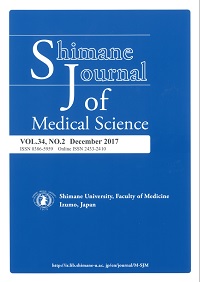Shimane University Faculty of Medicine
ISSN :0386-5959(冊子体)
ISSN :2433-2410(オンライン)


これらの論文は クリエイティブ・コモンズ 表示 - 非営利 - 改変禁止 4.0 国際 ライセンスの下に提供されています。
ダウンロード数 : ? 件
この文献の参照には次のURLをご利用ください : https://ir.lib.shimane-u.ac.jp/5873
Shimane Journal of Medical Science 20 2
2002-12-01 発行
A young female patient suffering from hypothermia in a cool environment
ファイル
内容記述(抄録等)
A 17-year-old female patient suffering from severe hypothermia was admitted to the Kanazawa University Hospital in winter, 1998. Her body temperature at admission was 31.8℃. There were no overt abnormalities responsible for hypothermia in routine physical, neurological and hematological examinations. Magnetic resonance images showed no specific changes in the brain, especially in the hypothalamus. When the patient was exposed to mildly cool environments (20℃ and 24℃), her rectal temperature gradually and continuously fell without associated autonomic and behavioral thermoregulatory responses. The patient felt cool, but did not notice the drop in her core temperature. In additional observations, the patient appeared to produce heat during fever, and could perspire during exercise. Taken together, it appears that the threshold core temperatures for cold-defense responses of the patient shifted to extremely low levels, which then resulted in pronounced hypothermia in a cool environment.
About This Article
Other Article
